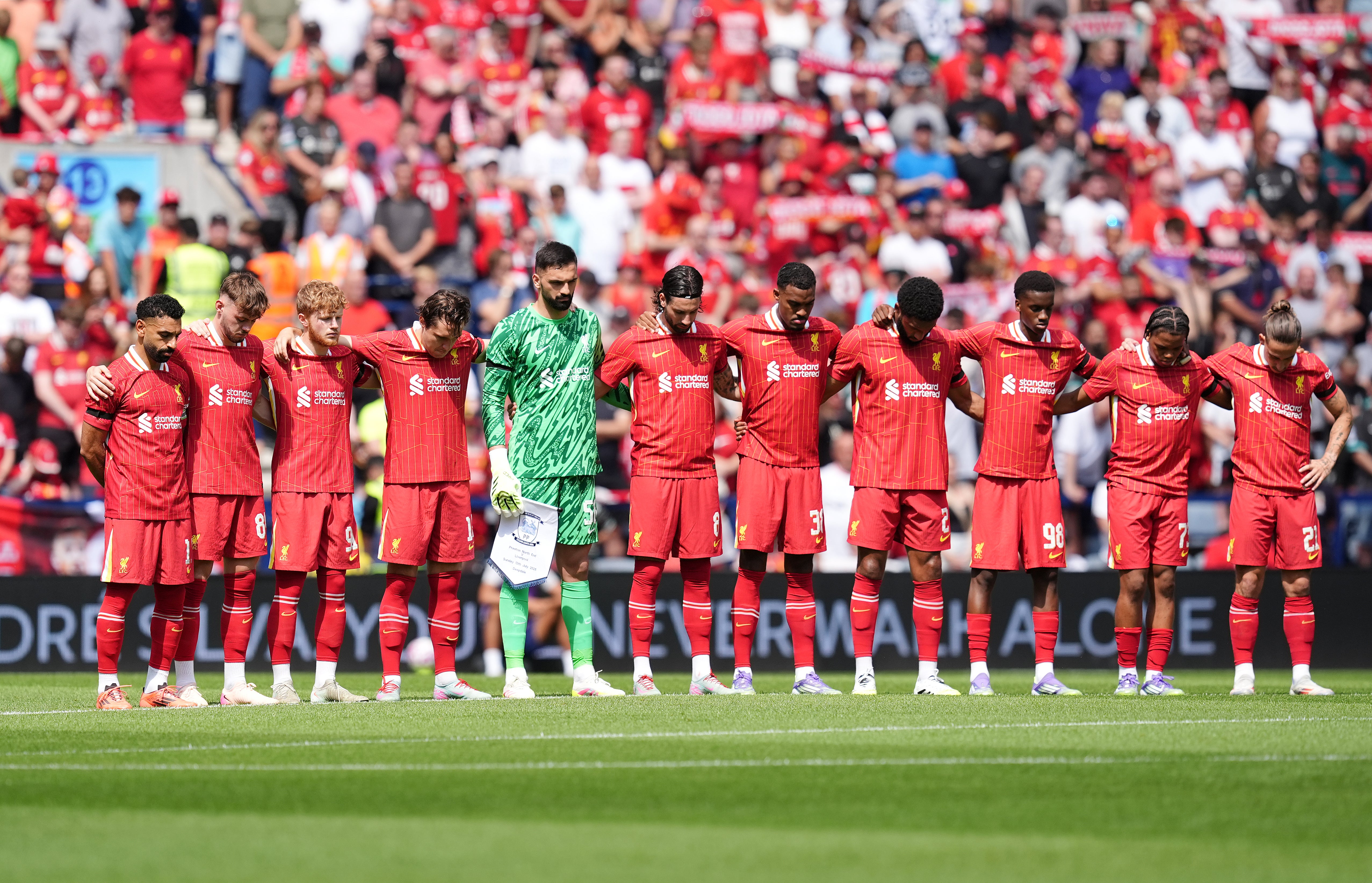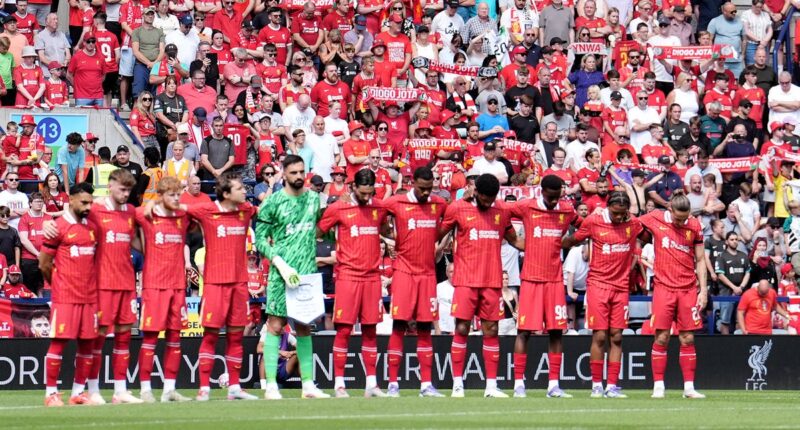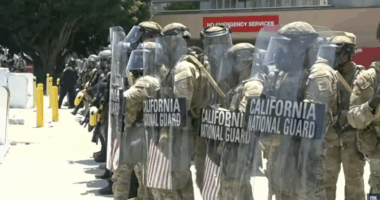Over an impossible last month, where Liverpool’s squad have shown admirable strength in striving to just keep going, some have been counselled that it’s going to hit them when they won’t expect it. It might be the empty place at training. It might be a highlight on television. It might be one of the many occasions when team’s fans sing his song, to the tune of “Bad Moon Rising”.
It might hit most over this weekend, when the lives of Diogo Jota and his brother Andre Silva will be commemorated all over the Premier League, but especially at Anfield on Friday.
You don’t really know when. You don’t really know how.
All Liverpool’s players can do is try to work through it, that sudden wave of grief from the loss of a joyful friend, who was far more than just a teammate.
The great difference – from a sporting perspective – is that it might come in front of crowds of thousands, in view of audiences of millions, and amid the expectation to perform as champions.
It is the affecting discordance of discussing a real-life tragedy, where people are grieving, within the context of sport’s relative trivialities. And yet games still have to be played. The football calendar just continues. The sport is also why millions more people were touched by Jota’s passing than just those who matter most – his young family and friends.

So while it almost feels misplaced to be talking about the potential effects of this on mere football, the reality of that context is that players are grieving. We have no idea how this will manifest.
That fosters an understandable inclination to not talk about Jota’s passing at all beyond the commemoration, to try and only discuss the football. You can already see the way the news cycle is naturally dominated by Liverpool’s very active transfer window, and especially the Alexander Isak saga. There are moments when it doesn’t feel like the same summer.
But Jota is there at the centre of it all, literally so, with the players who will wear “Forever 20” on the hearts of their shirts.
That symbolises how this will shape the entire campaign. That feeling will be all the more pronounced since there’s no comparable example in modern English football, nothing to reach for.
The game has had players pass at the prime of their career, and some of the most prominent are worth commemorating now: Jimmy Davis, Marc-Vivien Foe, Antonio Puerta, Dani Jarque, Besian Idrizaj, Davide Astori, George Baldock.
All grief is as pure as any other grief, but there’s an extra dimension in a football context when it involves reigning champions – particularly after all the emotion of the long wait that Liverpool had. There’s inevitably a greater focus, due to the status of the club and the obvious framework of defending a title. Liverpool are similarly in this incongruous situation of facing up to a historic opportunity: to build on that and create another glory era, and yet also working through a situation most could only imagine.

That’s also at a club with a deeply emotional identity, engendered by previous tragedies.
“Liverpool is known as a club that’s been through this public grief,” says Stefan Walters, a psychologist at Harley Therapy. “Hopefully that’s good for the players, that they’ll feel part of an organisation that gets them, and supports them.”
That touches on how one of the few remotely comparable examples is the emotional toll of Hillsborough or perhaps even a tragedy of a completely different scale, like the Munich air disaster that killed many of the Busby Babes.
Such moments actually remind you that the sport is uniquely adept at immediately coping with grief.
“If you look at football over the years, what it’s really good at, under the most intense grief and pressure, is that it does get things right naturally,” says Michael Caulfield, who works with Brentford but is speaking in his capacity as a trained psychologist. “I’ve been in companies and institutions where it’s wooden and clanky. Football is not clanky.”
The sport’s social and community values make its emotion feel natural in such moments.

There is, nevertheless, a difference between immediately coping with a tragedy and registering its deeper effects.
What will be said if Liverpool endure a bad run later in the season? What if they get off to a bad start? Will this be discussed as if they’re faltering champions, failing to defend their title in purely sporting terms? Or will it be excused as a natural consequence of mourning?
This isn’t to accuse or criticise, since these very pages will have to make assessments on something we can never really know.
“Football is played subconsciously,” Caulfield explains, “so whatever you’re thinking comes out on the pitch eventually.”
“They’re all going to be grieving in their own way and at their own pace,” Walters concurs. “There’s no right way. It’ll take them all the time that it takes. Some people find it very motivating, and others might find it a distraction.”
Taking the lead from psychologists, Liverpool would prefer players weren’t pressed on this and just talk about it when it feels right to.
“It’s important to let them process their grief in their own way,” Walters adds.
Jose Mourinho, who admirably captured the sentiment on Jota’s passing so well, has direct experience of this, having been at Porto when Rui Filipe died in August 1994.
“Instead of the boys suffering alone, it was like the group … was suffering together, trying to fight for his memory,” Mourinho said at the time. “We were champions, I think, for him.”

While this obviously isn’t to say there should be any expectation that Liverpool should play on the memory, Caulfield argues that “a football club might be the safest place” for such emotion.
The sport’s very calendar may even have an organic therapeutic effect. If coping with grief is about just going step by step, the fixture list makes you play that first game, then the next game, then the next game…
“I think it does help a lot as it’s immediate exposure therapy,” Walters says. “The best thing to do is to get back to normality as quickly as possible. The more you avoid it, the more it builds up. It’s better to be back among the familiar.”
That was what the Liverpool players already felt in going back to training, and then playing that important first friendly against Preston North End.
“You go out and play again,” Caulfield adds. “Most of them are very young and can’t quite process what’s happened, but I guarantee they’ll be arguing with the referee come Saturday, that’s the extraordinary thing, and that brings normality and routine back to your life.”
This was a sentiment articulated, poignantly, by Jota himself. Back in October, Liverpool made a 25-minute film for World Mental Health Day, and the forward volunteered to speak about the importance of airing your feelings.
“I still feel like when I enter the pitch, everything clears,” Jota said.
That is his personal experience, and won’t be true for everyone. Part of the sadness is that there’ll be no one like Jota. His teammates can only go through this in their own way.







